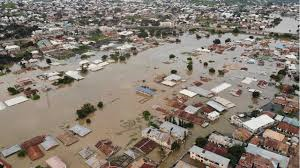Flooding in Nigeria has become a recurring nightmare, one that worsens each year with devastating consequences. From the destruction of homes and infrastructure to the displacement of millions, the human and economic toll is staggering. Yet, year after year, little is done to address the root causes. As climate change accelerates and extreme weather events become more frequent, it is imperative that the Nigerian government invests in effective and sustainable solutions to stem the tide of frequent flooding.
The argument for significant investment in flood control is clear. Nigeria’s economic stability is directly threatened by these floods. When farmlands are submerged and crops destroyed, food insecurity rises, leading to increased prices and potential shortages. Farmers, who make up a significant portion of Nigeria’s population, lose their livelihoods, and the agricultural sector, which contributes significantly to the country’s GDP, takes a massive hit. Additionally, the destruction of critical infrastructure—roads, bridges, and power lines—disrupts economic activities, compounding an already fragile economy. Rebuilding after floods is costly, and the government often spends more on emergency relief than it would on prevention measures. Investing in flood mitigation now will save billions in the future.
Beyond the economic rationale, the human cost is even more compelling. Floods claim lives, displace families, and create a humanitarian crisis. Year after year, vulnerable communities find themselves homeless, their possessions and livelihoods washed away. The psychological and emotional trauma of losing everything to an uncontrollable force is immeasurable. For a government that has pledged to improve the lives of its citizens, neglecting to address such a pressing issue is unacceptable. Prioritizing flood prevention is not just a matter of policy; it is a moral imperative.
Climate change is exacerbating Nigeria’s flood crisis, and this is no longer a distant problem. Rising sea levels, increasing rainfall, and unpredictable weather patterns mean that floods will only become more frequent and more severe. It is crucial for Nigeria to recognize this as an existential threat. Ignoring the signs of climate change will only lead to further disasters, compounding the effects of poverty and underdevelopment. Nigeria must act now, implementing long-term strategies to protect its people, environment, and economy from the inevitable impacts of a changing climate.
There are solutions available, and many countries have successfully curbed the impact of flooding. The Nigerian government must invest in modern infrastructure that can withstand the pressures of extreme weather. Building more resilient drainage systems in urban areas, restoring wetlands to absorb excess water, and constructing dams and levees in flood-prone regions are necessary steps. Furthermore, early warning systems and emergency preparedness plans should be enhanced to reduce casualties when floods occur. But this is not only about technology and infrastructure; it is also about policy. The government needs to enforce stricter regulations on deforestation, urban planning, and waste management, all of which contribute to the flooding problem.
Addressing Nigeria’s flood crisis requires political will. Flooding has become so routine that it no longer shocks the public or spurs action. This sense of inevitability must be countered by a government that is proactive, not reactive. It must commit to sustainable development, prioritize environmental protection, and collaborate with international partners to access funding and technical expertise. Investing in flood prevention is an investment in the future of Nigeria—a future where communities are safe, the economy is robust, and the environment is preserved.
The time for half-measures is over. Floods are not going away, but their impact can be mitigated. The Nigerian government must rise to the challenge, not only to save money or infrastructure but to safeguard the lives and futures of its people. By investing in comprehensive flood prevention strategies, Nigeria can turn the tide on one of its most pressing crises.





